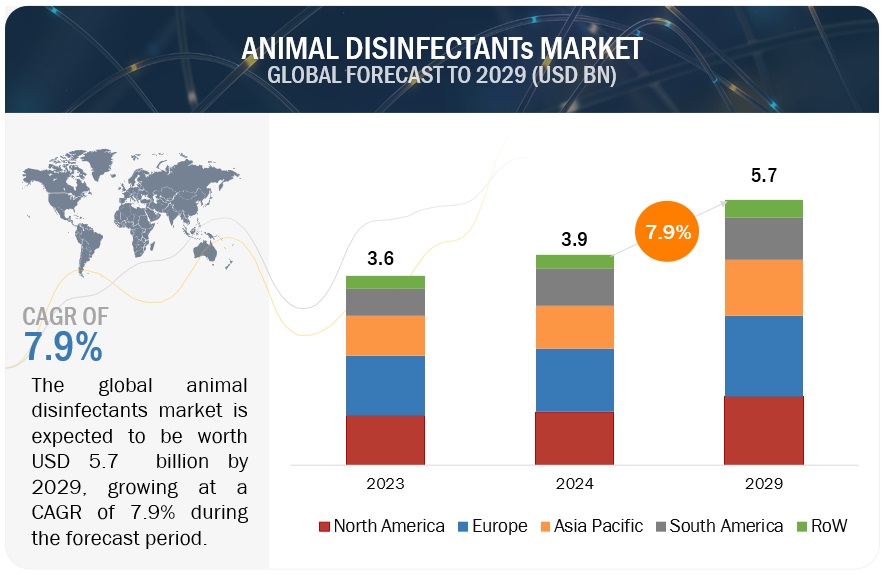Animal Disinfectants Market: Growth Opportunities and Recent Developments
The animal disinfectants market is projected to reach USD 4.9 billion by 2028 from USD 3.4 billion by 2023, at a CAGR of 7.7% during the forecast period in terms of value. The global demand for animal disinfectants is on the rise due to several factors. Increased focus on biosecurity measures to prevent the transmission of diseases among animals, particularly in livestock and poultry farming, has contributed to the heightened demand. Additionally, the persistent threat of zoonotic diseases has further emphasized the need for effective disinfection. As a result, the global market for animal disinfectants has experienced significant growth to meet these evolving demands.

Download PDF Brochure: https://www.marketsandmarkets.com/pdfdownloadNew.asp?id=38718363
By type, Iodine is anticipated to have the fastest growth rate during the forecast period.
Iodophors are disinfectants formed by the combination of iodine and various other carrier compounds, as well as stabilizing agents such as Globaline, which is composed of tetraglycine hydroperiodide, sodium acid pyrophosphate, and talc. These helps release iodine in an acid medium and have disinfectant properties, which affect bacteria, viruses, and some spores. Iodophors are generally used for disinfection & cleaning, bovine teat dips, and surgical scrubs. Hard water and the presence of a large amount of organic material reduce the activity of iodophors. However, iodophor disinfectants function effectively in the presence of traces of organic materials.
By application, the dairy cleaning segment is projected to dominate the market during the forecast period.
The cleaning of dairy cattle involves removing equipment and bedding before cleaning. The nature of the surfaces will influence the disinfection process. Rough and porous surfaces are difficult to disinfect in comparison to smooth surfaces. Both the milking parlor and milk toxin-producing machines must be cleaned daily. The milking machines, including the teat dips and milk tongs, are among the major sources of infection and can have an adverse impact on the health of the livestock. Therefore, these disinfectants can be applied to various areas, including milking parlors, holding pens, feeding areas, equipment like milking machines and others to thoroughly sanitize and eliminate the potential sources of contamination. Also, the regular utilization of animal disinfectants in dairy cleansing helps to create a healthier and more productive environment for both animals and dairy workers, thereby promoting the overall well-being and efficiency of the dairy operation.
Request for Sample Pages: https://www.marketsandmarkets.com/pdfdownloadNew.asp?id=38718363
Europe is expected to lead the animal disinfectants market with the highest market value during the forecast period.
Europe is one of the leading per capita consumers of chemicals and is a key market for animal disinfectants. There has been a significant utilization of animal disinfectants for farm animals in the region to reduce animal diseases. Regulatory requirements and standards regarding animal health and welfare are becoming more stringent in Europe. Compliance with these regulations necessitates the use of effective disinfection protocols. As a result, farmers and animal care facilities are seeking reliable and approved animal disinfectants to ensure they meet the required hygiene standards. This has contributed to the rising demand for such products in the European market. The region also has a significant livestock population that includes poultry, cattle, swine, and others. The concentration of livestock in the region, both in terms of commercial farming and smaller-scale operations, creates a substantial market for animal disinfectants to preserve the health and hygiene of the animals.
The key players of the market include Neogen Corporation (US), GEA Group (Germany), Lanxess (Germany), Zoetis (US), Solvay Group (Belgium), Kersia Group (France), Stockmeier Group (Germany), Ecolab (US), Albert Kerbel GMBH (Germany), PCC Group (Germany), G Sheperdanimal Health (UK), Sanosil Ag (Switzerland), Delaval Inc (Sweden), Diversey Holdings Ltd (US), Fink Tech Gmbh (Germany).



